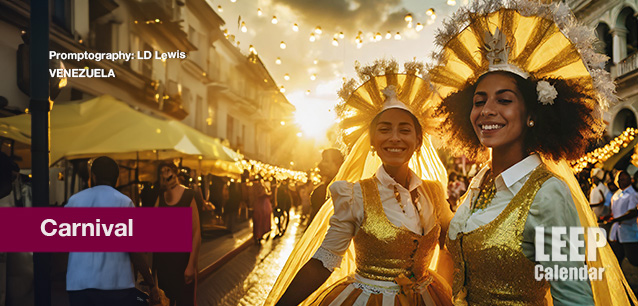 AD
AD
Today is: August 27
Scroll to explore events active on this date.
LEEP INK FEATURES

August? Absolutely!
In August, we live through the Dog Days of Summer. It's hot and often humid, and those who can leave for better climates do. Down south, winter is in full force. August is also known as "the ...

In The Heat of July: July 2025 Events
Is it hot enough (or cold enough if you're below the equator) for you yet? There is actually a day for that! Like every month, I pick a diverse collection of events you may or may not know about. This ...

May Blooms: Events in May 2025
Along with October, May is one of the most densely packed months of the year. It's before the summer humidity and the last whole month of the school year. The weather is warming in t...
About the Venezuela Carnival
Food , Festivals & Fairs
Brazil & South America
Ends: Mar 04, 2025
DESCRIPTION:
Carnival in Venezuela is a vibrant and lively event, reflecting the country's rich cultural tapestry. As in other Latin American countries, Carnival celebration is deeply rooted in a mixture of indigenous, African, and European traditions.
The customs and the reasons for celebrating Carnival in Venezuela include:
VENEZUELAN CARNIVAL CUSTOMS
Parades and Costumes:
The colorful parades are one of the most visually striking aspects of the Venezuelan Carnival. Participants often wear elaborate costumes, masks, and headdresses. These parades typically feature a mix of dance, music, and, often, thematic floats.
Music and Dance:
Music is a central part of the celebrations, with genres like Salsa, Merengue, and local folk music dominating the scene. Dancing in the streets is common, with everyone from children to the elderly participating.
Water Fights:
In some regions of Venezuela, it's customary for people to engage in friendly water fights during Carnival. This can involve everything from water balloons to buckets of water, and it's trendy among children.
Beauty Pageants:
Beauty pageants are a significant aspect of the Carnival, where local towns often elect a "Carnival Queen."
Food:
Traditional Venezuelan foods are enjoyed during Carnival. Dishes such as arepas, empanadas, and hallacas are popular, as well as sweet treats like 'quesillo' (a type of flan) and 'arroz con leche' (rice pudding).
WHY VENEZUELANS CELEBRATE CARNIVAL
Religious Roots:
Originally, Carnival in Venezuela, as in many other Catholic countries, was a way to indulge in festivities and excesses before the somber period of Lent, the 40 days of fasting and penance before Easter.
Cultural Expression:
Carnival has evolved to become a celebration of Venezuelan culture, showcasing the country's diverse musical styles, dance traditions, and culinary heritage.
Community Bonding:
It's a time for communities to unite, put aside their daily routines and differences, and enjoy the festivities.
Preservation of Traditions:
The event also serves to preserve and pass down various cultural traditions and folklore to younger generations.
Carnival in Venezuela is a festive, colorful, and joyous event that blends religious, cultural, and social elements. It's a time for celebration, indulgence, and cultural expression, deeply cherished by Venezuelans.
VIDEOS
Currently, this event does not have supporting videos.
SUPPORTING DOCUMENTS
Currently, this event does not have supporting documents.
ADDITIONAL IMAGES
Currently, this event does not have supporting images.
Where would you like to go now?
 AD
AD


/footer-logo.svg)
